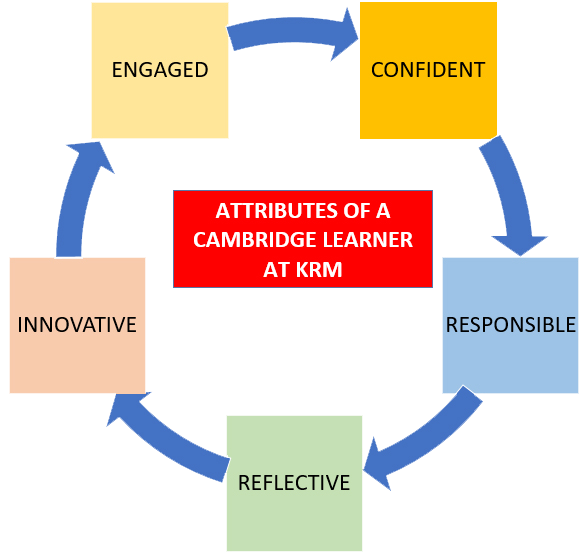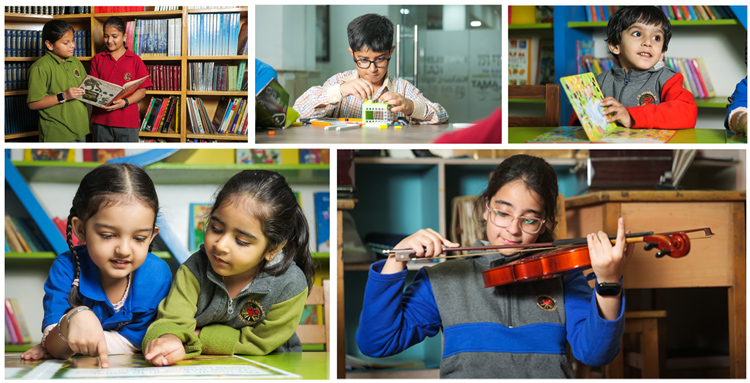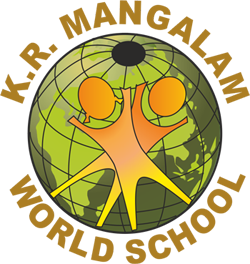HOW CAMBRIDGE LOOKS LIKE at K.R. MANGALAM WORLD SCHOOL, GK-II

The world changes rapidly, bringing with it an ever-shifting array of opportunities, as well as challenges. At Cambridge International, we are fully committed to giving our learners the skills and knowledge to navigate the 21st century world with passion and curiosity. We believe education works best when curriculum, teaching, learning and assessment are closely aligned.
The head of the institution, Dr. Jyoti Gupta, endorses a holistic education model where each child has a unique identity and self-esteem, which is valued and promoted. As a leader, she has an experience of leading schools with both national and international curriculum. Not only cultivating a global outlook, she has assiduously showcased instructional leadership and built paradigm in the field of education.
Faculty
At KRM, well qualified, trained and hand-picked teachers are selected who ensure to facilitate the students with the best practices in the teaching and learning process.
The faculty is constantly updated with the latest professional development designed to reflect in a variety of educational contexts, thereby improving the performance and
practice of teachers, improving student outcome, throughout their careers. The teachers had undergone training of the Cambridge Programme for the Early Years Primary and
Lower Secondary Level.
They were trained to transact the curriculum for subjects that included English, Mathematics, Science, Global Perspective, Music, Art & Design, Digital Literacy, Computing
and Physical Education.

Curriculum
A flexible curriculum aims at Deep Subject Knowledge and helps learners develop the ability to solve problems, apply understanding to new situations and help them progress to the next stage. With the focus on Conceptual Understanding, learners have a greater depth of subject knowledge. They build confidence in applying knowledge and skills in new situations, fluency to talk about their subject conceptually and show different aspects linked together. This helps them to achieve a level of mastery of their subject and acquire higher education. Higher Order Thinking Skills enhance Critical Thinking, Independent research, Collaboration and presenting arguments.
The subjects included in the comprehensive curriculum are English, Mathematics, Science, Art & Design, Digital literacy, Global Perspectives, Computing, Music and Physical Education. A broad and balanced education will be provided to the learners. With ten subjects to choose from, including English, Mathematics and Science, the students will find plenty of opportunities to develop creativity, expression and well-being in a variety of ways.
The subjects can be offered in any combination and adapted to suit the context, culture and school ethos.
Cambridge English
Cambridge English syllabus supports an integrated approach to teaching the four skills-Speaking, Listening, Reading and Writing. Activities will be organized using fiction genres, poetry, play scripts and non-fiction texts that promote experience, reflection and improvement in skills development. Cambridge English as Second Language will help learners’ develop curiosity about other languages and cultures, and how these shape perceptions of the world. They will be able to communicate effectively and become confident in and enjoy reading a range of texts as their skills develop.
Cambridge Art & Design
Cambridge Art & Design will be taught through a broad range of investigative, art-making and reflective activities including a number of study areas, for example painting, print making, model making digital art or using the resources that are available locally. This course supports progression to Cambridge Lower Secondary Art & Design
Cambridge Computing
Cambridge Computing provides plenty of opportunities for learners to investigate and create programs like animations, quizzes and games throughout each stage, using the constructs that they discover. Activities that enable learners to sequence instructions away from the computer, such as card sorting tasks, will help them to consider and discuss the key principles of logic and precision. Students will get opportunities to see and interact with real networked hardware and other machines, both new and old. This will help them to understand the context of computers beyond those that they use in the classroom or at home.
Cambridge Digital Literacy
Cambridge Digital Literacy will develop content creation skills while preparing to present their work in mathematics or science, and safety messages can be embedded within cross-curricular sessions about how learners should conduct and protect themselves in the modern world. This course supports progression to Cambridge Lower Secondary Digital Literacy. The subject will help them to develop skills of research, analysis, evaluation, reflection, collaboration and communication. It strengthens the links across English as a first or second language, mathematics, science and ICT Starters.
Cambridge Global Perspectives
Cambridge Global Perspectives will help students develop and embed cross-curricular skills at an early age and support them in their studies as they progress to and beyond. The educators will create a series of challenges and integrate these into their existing teaching or lessons. The challenges could range from one hour to six hours. These can be subdivided into a range of activities which would cover a range of skills.
Cambridge Mathematics will help students develop a holistic understanding of the subject, focusing on principles, patterns, systems, functions and relationships. They will become mathematically competent and fluent in computation, which they can apply to everyday situations. ‘Thinking and working mathematically’, a unique feature of the curriculum, encourages learners to talk with others, challenge ideas and to provide evidence that validates conjectures and solutions. When learners think and work mathematically, they actively seek to make sense of ideas and build connections between different facts, procedures and concepts. This supports higher order thinking that helps them to view the world in a mathematical way. The subject is divided into three main areas called ‘strands’, which run through every primary mathematics stage. Learners will develop skills in Number, Geometry and Measure Statistics and Probability. The strands work together to help students recognize connections of mathematical concepts as they engage in creative mathematical thinking to generate and improve numerical fluency.
Cambridge Primary Music
Cambridge Primary Music is designed to be flexible, so learners can perform through singing and playing musical instruments of any kind. Learners will experience music from their own culture as well as explore music from other times and places. The subject is designed to complement, rather than replace, instrumental or singing lessons.
Cambridge Physical Education
Cambridge Physical Education is taught through a broad range of tasks, challenges and physical activities. It includes cooperative, competitive, athletic, adventurous and health-based contexts that are appropriate for each learning stage. These activities will promote learners’ confidence, self-esteem, cognitive abilities and social skills. The subject is designed to complement, rather than replace, coaching in individual sports or physical activities.
Cambridge Science
Cambridge Science will help students to think scientifically and develop practical skills alongside knowledge and understanding, which is vital to understand the world. Improving learners’ awareness of science develops their sense that ‘science is for me’ and they connect with the subject. This approach will provide them with the knowledge and skills they require to excel in the subject, in later stages of education and to make informed choices, including considering sustainability issues and meeting the challenges facing our environment.
Assessments
Accurately measuring a student’s potential and progress can transform learning and help educators make informed decisions about individual learners, their educational needs and help them improve in the required areas. To measure the potential of each student Cambridge computer-based assessments are curated for 5-11 year olds. The diagnostic assessments help to identify and diagnose learning needs, adapt to each student’s level, accurately measuring and benchmarking learners’ potential. As the tests are computer-based, results are provided automatically.
The assessments enable the educators to assess some subjects in the classroom through discussion, observation and lesson outputs. Based on the assessment guidance they will give a formative feedback on the skills that learners would have to develop and then reflect on and improve their performance. Monitoring the progress of students is vital. Cambridge Progression Tests are internal assessments that help to check learners’ knowledge, skills and understanding. It is available for the core subjects- English as a first or second language, Mathematics and Science. The Primary progression tests are marked by teachers in school and are available for stages 3, 4, 5 and 6 and the Lower Secondary progression tests are marked by teachers in school and are available for stages 7, 8 and 9.
The last step of assessment is Checkpoint. It monitors individual and group performance at the end of the programme at each level. These external tests are marked by Cambridge International to give extra confidence in the feedback the teacher receives and share with parents.
The school looks forward to introduce the IGCSE curriculum in Upper Secondary level in the near future. Cambridge Upper Secondary builds on the foundations of Cambridge Lower Secondary. It provides a broad and balanced study across a wide range of subjects, using learner-centred and enquiry-based approaches to learning. Students will take internationally recognized Cambridge IGCSE or Cambridge O Level qualifications at the end of Cambridge Upper Secondary.
INFRASTRUCTURE
- Technology enabled classrooms
- Independent I-Pads provided to learners
- Mac Books in each class
- Ideal Teacher – Student Ratio
- Separate subject rooms
- Well-equipped Activity Room
- Updated collection of resources at the library
- Special Sports and music Programme
- Safe and secure environment – enabled with CCTV surveillance




